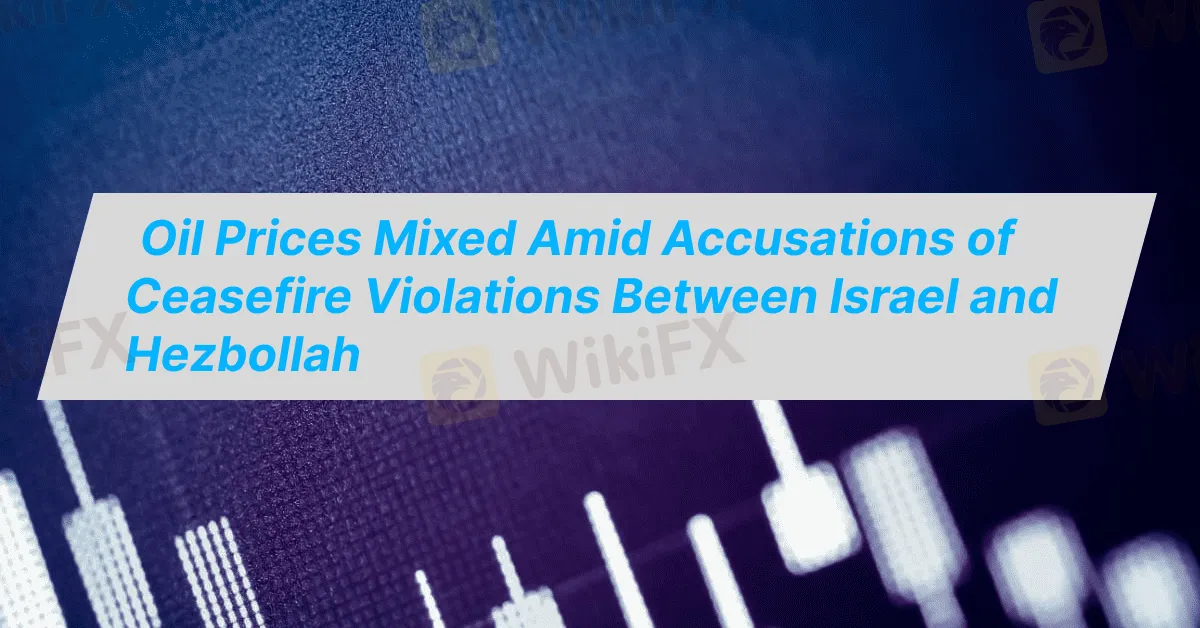简体中文
繁體中文
English
Pусский
日本語
ภาษาไทย
Tiếng Việt
Bahasa Indonesia
Español
हिन्दी
Filippiiniläinen
Français
Deutsch
Português
Türkçe
한국어
العربية
Oil Prices Mixed Amid Accusations of Ceasefire Violations Between Israel and Hezbollah
Abstract:According to the report, Oil prices were mixed on Friday, with concerns over potential supply risks resurfacing following accusations from both Israel and Hezbollah regarding violations of their ceasefire. Investors are also awaiting a decision on OPEC+ output policy, as a delay to the group’s meeting adds uncertainty to the market.

According to the report, Oil prices were mixed on Friday, with concerns over potential supply risks resurfacing following accusations from both Israel and Hezbollah regarding violations of their ceasefire. Investors are also awaiting a decision on OPEC+ output policy, as a delay to the groups meeting adds uncertainty to the market.
By 02:32 GMT, Brent crude futures had dropped 7 cents, or 0.1%, to $73.21 per barrel. In contrast, U.S. West Texas Intermediate (WTI) crude futures rose by 38 cents, or 0.55%, to $69.10 compared to Wednesdays close.
Market trading was subdued due to the Thanksgiving holiday on Thursday, which resulted in the closure of U.S. financial markets.
On Thursday, Israel and Hezbollah exchanged accusations over alleged violations of their ceasefire, which had come into effect the day before. Initially, the ceasefire had appeared to alleviate fears of broader conflict and potential disruptions to oil supplies in the region. Despite these tensions, oil flows from the Middle East have remained largely unaffected by the ongoing conflicts between Israel and Hezbollah in Lebanon, as well as Hamas in Gaza.
Meanwhile, Russia launched a second attack this month on Ukrainian energy facilities, raising concerns over the risk of retaliatory actions that could impact Russian oil supplies. ANZ analysts noted that the escalating situation could disrupt oil production in the region.
Adding to the uncertainty, OPEC+—the coalition of OPEC members and their allies, including Russia—delayed its upcoming policy meeting to December 5th from the previously scheduled December 1st to avoid a conflict with another major event. Market expectations are that OPEC+ will extend its production cuts during the meeting.
In Iran, the country informed the United Nations nuclear watchdog of plans to install more than 6,000 additional uranium-enriching centrifuges at its nuclear facilities. Goldman Sachs analysts warned that if Western powers ramp up sanctions enforcement on Iranian oil exports, the country could see a reduction in crude oil production by up to 1 million barrels per day in the first half of next year.

Disclaimer:
The views in this article only represent the author's personal views, and do not constitute investment advice on this platform. This platform does not guarantee the accuracy, completeness and timeliness of the information in the article, and will not be liable for any loss caused by the use of or reliance on the information in the article.
Read more

OctaFX Flagged by Malaysian Authorities
OctaFX has been officially listed on warning lists by both Bank Negara Malaysia (BNM) and the Securities Commission Malaysia (SC). These alerts raise serious concerns about the broker’s status and whether it is legally allowed to operate in Malaysia.

TradingPRO: A Closer Look at Its Licences
In an industry where safety and transparency are essential, the regulatory status of online brokers has never been more important. For traders seeking to protect their capital, ensuring that a platform operates under recognised and stringent oversight can make all the difference. Keep reading to learn more about TradingPRO and its licenses.

Oil Price Breakout Incoming? Investors Should Stay Alert
Oil prices are hovering around a critical level, with potential yet to be fully unleashed. Investors must prepare for sudden changes.

New SEBI Regulations on Intraday Trading
The Securities and Exchange Board of India (SEBI) has implemented revised regulations on Intraday trading, with effect from November 20, 2024. These regulations are meant to lessen risks and prevent speculative trading practices.
WikiFX Broker
Latest News
SkyLine Guide 2025 Malaysia: 100 Esteemed Judges Successfully Assembled
Vantage Markets Review 2025: Trusted Forex and CFD Trading Since 2009
Why STARTRADER Is Popular Among Traders?
A Guide to Intraday Forex Trading You Can't Miss Out
CONSOB Blocks Access to 13 Unauthorized Investment Websites
TradingPRO: A Closer Look at Its Licences
The world could be facing another ‘China shock,’ but it comes with a silver-lining
New SEBI Regulations on Intraday Trading
Everything You need to know about Barath Trade
IronFX Broker Review 2025: A Comprehensive Analysis of Trustworthiness and Performance
Currency Calculator


